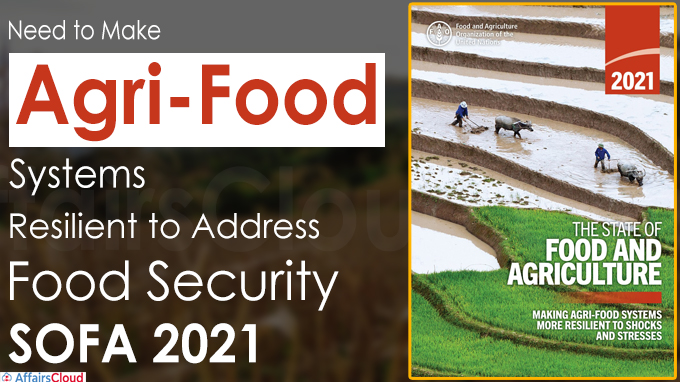 The Food and Agriculture Organization of the United Nations (FAO)’s The State of Food and Agriculture (SOFA) 2021 Report entitled “Making agrifood systems more resilient to shocks and stresses” states the need to enhance the resilience of the agri-food systems to address food security.
The Food and Agriculture Organization of the United Nations (FAO)’s The State of Food and Agriculture (SOFA) 2021 Report entitled “Making agrifood systems more resilient to shocks and stresses” states the need to enhance the resilience of the agri-food systems to address food security.
- The report provides an assessment of the ability of national agrifood systems to respond to or recover readily from shocks and stresses.
- This flagship publication(SOFA 2021) is part of The State of the World series of the FAO.
SOFA 2021:
i.The State of Food and Agriculture 2021 presents country-level indicators of the resilience of agri-food systems.
ii.The indicators measure the robustness of primary production and food availability, as well as physical and economic access to food.
iii.It discusses options to minimize trade-offs that building resilience may have with efficiency and inclusivity
Aim:
- To offer guidance on policies to enhance food supply chain resilience, support livelihoods in the agri-food system.
- To ensure sustainable access to sufficient, safe and nutritious food to all in the face of disruption.
Click here for the complete report – SOFA 2021
Gist of the report:
World Agri-Food System:
i.The world’s agri-food systems comprises a global enterprise that annually produces around 11 billion tonnes of foods, and a multitude of non-food products which includes 32 million tonnes of natural fibres and 4 billion cubic metre of wood.
ii.The gross value of agricultural output in 2018 was USD 3.5 trillion.
- Agri-food systems include primary production, food supply chains, domestic transport networks, and households, and involve many interlinked actors.
- Agri-food systems employ 4 billion people directly or indirectly. The agri-food sector, including forestry and fisheries, also accounts for a third of the anthropogenic greenhouse gas emissions driving climate change. It occupies 37 per cent of the Earth’s land area.
iii.The primary production will provide around one-quarter of all employment globally, more than half in sub-Saharan Africa and almost 60% in low-income countries
Key Points:
i.Loss in income and purchasing power has pushed more than 118 million people into becoming undernourished.
ii.The loss in purchasing power has affected the food security and nutrition of billions of people especially in low income countries and among the poorest.
iii.A robust transport network supports agri-food systems’ resilience to shocks and stresses and guarantees physical access to food at local level.
iv.Around 3 billion people cannot afford a proper diet that will protect them against malnutrition and an additional 1 billion will be added to this group if a shock reduced their
income by one-third in the 143 analysed countries.
v.The food cost for more than 845 million people will be affected with the closure of a critical transport route could increase travel time by 20% or more for food diverted from the disrupted route.
Sustainable agri-food system
Sustainable agri-food systems which deliver food security and nutrition for all, while sustaining the livelihoods of agri-food systems actors, without compromising the economic, social, and environmental bases for the food security and nutrition of future generations.
Recommendations:
i.Based on the data of the report, FAO recommends the governments to enhance the resilience of agrifood systems as a part of the responses to ongoing and future challenges.
ii.According to the report the guiding principle is diversification of input sources, production, markets and supply chains, as well as of actors will create multiple pathways for absorbing shocks.
iii.Supporting the development of Small and medium agri-food enterprises (SMAEs), cooperatives, consortia and clusters will assist in maintaining diversity in the domestic agri-food value chain.
iv.The well connected agri-food networks overcome disruptions faster by shifting sources of supply and channels for transport, marketing, inputs and labour.
v.The report also suggested that enhancing the resilience capacities of vulnerable households is vital to ensure a world free from hunger.
vi.This can be achieved through improved access to assets, to diversified sources of income and social protection programmes in the event of shocks.
About The Food and Agriculture Organization of the United Nations (FAO):
Director General– QU Dongyu
Headquarters– Rome, Italy




